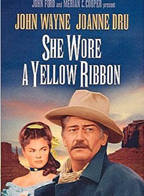
The movie in set in 1876. Custer has just been defeated at the Little Big Horn. There is a voice over narration :
Custer is dead. And from the Canadian border to the Rio Bravo 10,000 Indians Kiowa, Comanche, Arapaho, Sioux and Apache under Sitting Bull, Crazy Horse, Gall and Crow King are uniting in a common war against the United States Calvary.
This is the second of John Ford's Calvary Trilogy. In this one John Wayne plays Captain Nathan Brittle whose job it is to head off the oncoming trouble.
This is not a movie about American Indians but they do play a major factor in it. The movie shows how Union and Confederate forces joined together to fight the common enemy. The movie has been described as a propaganda piece that is geared towards getting Americans united to face the Communist threat during the Cold War era of 1949. The Indians are used as a threat the way they had been used in many earlier movies.
In the end it is the intelligence of Captain Brittle that wins out. When he goes into the hostile camp to visit his friend Pont That Walks he scouts out where the ponies are kept. He then is able to use this intelligence to drive off the ponies and save the day.
One aspect of the movie I didn't like too much was the dialogue between Nathan and Pony That Walks (played by Chief Big Tree). The following could have been written much, much better.
Hey Nathan, Nathan. I am a Christian. Halleluiah. Old friend me. Long time. Long time.
I come in peace, Pony That Walks.
Take a salt. Take a salt. Smoke a pipe. Good. Good.
This very patriotic movie ends with the voice over narration
So here they are: the dog-faced soldiers, the regulars, the fifty-cents-a-day professionals... riding the outposts of a nation. From Fort Reno to Fort Apache - from Sheridan to Startle - they were all the same: men in dirty-shirt blue and only a cold page in the history books to mark their passing. But wherever they rode - and whatever they fought for - that place became the United States.